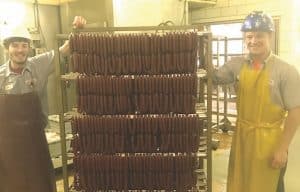Meat shortage not hitting smaller shops as hard

some fresh smokies at Schubert’s Smokehouse in Millstadt.
One of the most recent repercussions of the coronavirus has once again been seen on grocery store shelves.
This time, the shortage is not on toilet paper or disinfecting products, but meat.
Many stores have faced problems with their supply chain that have forced them to take measures like raising prices or limiting how much customers can buy.
The shortage has not hit smaller meat stores the same way, though they are still feeling its reverberations.
“We had not had a meat shortage,” said David Kossina, president and owner of Schubert’s Smokehouse in Millstadt. “Some of the of the bigger chains and companies that depend on these huge packing houses that are currently going through the coronavirus, I have seen those stores go through a shortage.”
“I think the shortage has come from meat that comes through the big packers who have shut down,” agreed Pam Miller, co-owner of Miller’s Meat Market in Red Bud.
Smaller shops have not had the same problems larger stores have because they get their meat locally.
Schubert’s, for example, harvests hogs from a local farmer, gets beef regularly from a supplier and acquires chicken from a local supplier.
Miller’s is similar.
“We butcher with local beef, so that has helped us have more supply,” Miller, who co-owns the store with her husband, said. “We’re a true, old-fashioned meat market. We are not a grocery store.”
Despite not having the same problems as grocery stores, these smaller operations are still experiencing difficulties due largely to increased demand as customers are buying in bulk.
“I don’t know if it’s a meat shortage. I would call it a meat hoarding,” Kossina said.
“Initially, I think people were buying out of fear,” Miller added. “You would notice many more people purchasing large amounts. We had people from all adjoining towns and across the river.”
That has slowed down some after surges when the pandemic first hit and when the meat shortage first started being reported on, according to Miller.
But the small businesses are still seeing more people than usual, and that will most likely continue given the calendar.
“Easter and Mother’s Day contributed to it,” Kossina said of the demand, adding “the next big push (was) Memorial Day.”
Plus, Miller said more people are cooking at home and buying more meat for those dishes.
Even though they have not had many problems getting their products, small meat shops have still had to raise prices in some cases.
“The pricing has gone up, both on the retail end and on the wholesale end, and that’s simply because of supply and demand,” Kossina summarized.
To combat all these issues, workers are putting in extra hours at these meat stores.
Kossina said his employees are working about 60 hours a week as the company is operating at 140-150 percent capacity. Kossina also had to add a beef supplier to keep up with demand.
Miller said she and her husband are working seven days a week while the staff is working extended hours.
So far, these stores have not had to implement limits, though Miller said she recently stopped selling its bundles of meat “just so we could get our head above water,” as people were buying up to seven bundles at a time.
Kossina has taken a slightly different approach of “level setting” with customers looking to buy in bulk.
In one case, he persuaded a couple who wanted to buy 200 pounds of ground beef to buy only enough for a month so his store could keep its stock relatively full.
“I said, ‘I will be out of meat if everybody comes in and wants 200 pounds for their freezer. Our ground beef we ground fresh daily. Why do you want something sitting in your freezer for three months when you can come in and get it fresh ground the day of,’” Kossina recalled.
So far, patrons have been understanding.
“We appreciate everybody being so respectful and kind,” Miller said. “As stressful as the time has been, I can honestly say that every customer has been courteous and very sympathetic to our staff’s needs.”
Kossina said he hopes people remember the service these stores are providing when the shortage is over.
“I hope that when the supply chain is back functioning normal that they still do consider the mom and pop organizations because we’re the ones who are sponsoring their soccer teams, baseball teams, softball teams,” he reasoned. “It’s not the big companies.”






